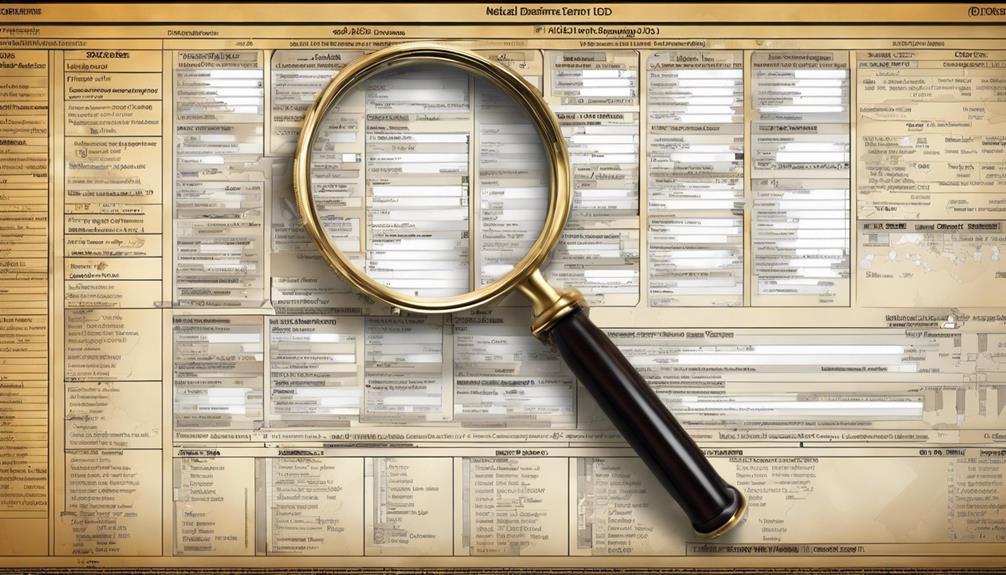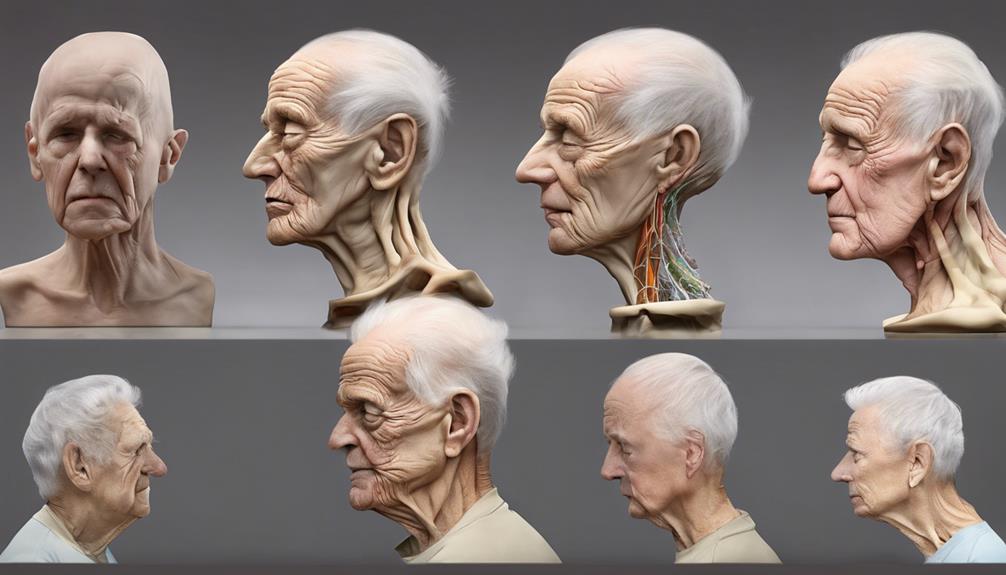As we explore the realm of healthcare coding, the Dementia ICD Code emerges as a complex and detailed puzzle, ready for our skilled deciphering.
Understanding the nuances of this code not only aids in accurate documentation but also lays the foundation for streamlined patient care pathways and enhanced research insights.
So, how does this code influence the broader narrative of dementia management and what implications does it hold for healthcare professionals and researchers alike? Let's explore the intricacies together.
Key Takeaways
- ICD codes crucial for accurate dementia classification.
- Proper documentation essential for effective coding.
- ICD codes aid in research data analysis.
- Accurate coding vital for treatment and management of dementia.
Overview of Dementia ICD Code
The ICD-10-CM code F03.90, effective from October 1, 2023, categorizes unspecified dementia without behavioral disturbance.
Dementia, falling under major neurocognitive disorder in the ICD-10-CM, encompasses symptoms like cognitive decline, impacting social and occupational functions. This condition is often associated with diseases such as Alzheimer's disease, where individuals experience a progressive loss of cognitive abilities over time.
Treatment options for dementia include cholinesterase inhibitors to manage symptoms and non-drug approaches like occupational therapy. Cholinesterase inhibitors help improve cognitive function, behavior, and daily living activities in some patients. Occupational therapy aims to assist individuals in maintaining independence by focusing on activities of daily living, cognitive skills, and environmental modifications.
Importance of Accurate Coding

Accurate coding of dementia in the healthcare system is a crucial element for ensuring proper documentation and effective management. It allows for precise tracking of the known physiological conditions, behavioral symptoms, and memory loss associated with diseases like Alzheimer's. Causes include Alzheimer's disease, making accurate diagnosis code assignment vital for appropriate treatment. The use of billable/specific codes for adult diagnoses is essential to ensure proper reimbursement and resource allocation. Additionally, coding accuracy aids in the identification of suitable drugs for management. Through accurate coding, healthcare providers can better understand the epidemiology and outcomes of dementia, enabling more targeted interventions. In the table below, we highlight the significance of accurate coding in dementia care:
| Importance of Accurate Coding | ||
|---|---|---|
| Ensures proper documentation | Supports research efforts | Facilitates effective management |
| Tracks prevalence and impact | Aids in quality reporting | Enhances communication |
Common ICD Codes for Dementia
When diagnosing dementia, healthcare professionals commonly utilize specific ICD codes to categorize and track different types of the condition accurately. Understanding these ICD-10 codes is crucial for proper diagnosis, treatment, and billing processes related to dementia care.
Here are some commonly known ICD-10 codes for different types of dementia:
- F01.50: Vascular dementia without behavioral disturbance
- F02.80: Dementia in other diseases without behavioral disturbance
- F03.90: Unspecified dementia without behavioral disturbance
- G30.0: Alzheimer's disease with early-onset
Assigning G31.1 for senile degeneration of the brain allows healthcare providers to classify and manage various forms of dementia effectively. By utilizing these specific codes, healthcare professionals can ensure accurate documentation, appropriate reimbursement, and streamlined care pathways for patients with dementia.
Proper coding facilitates the provision of necessary services to individuals affected by cognitive impairments, enhancing the quality of their healthcare experience.
Coding Challenges and Solutions

Navigating the intricacies of dementia coding demands precision and ongoing awareness of evolving guidelines and diagnostic criteria. Coding challenges for dementia stem from the diverse types of dementia and the various underlying conditions that can contribute to its development. Ensuring specificity in diagnosis codes is crucial to accurately capture the type of dementia a patient presents. Proper documentation of symptoms, their severity, and any associated underlying conditions is paramount in selecting the appropriate ICD-10 code. Compliance with billing regulations necessitates clinicians to stay informed about coding guidelines and updates, adapting their coding practices accordingly.
To address these challenges, clinicians can refer to resources like the ICD-10-CM manual for guidance. Seeking clarification from coding experts can also help in overcoming complexities related to dementia diagnoses. By enhancing documentation practices, staying abreast of coding changes, and seeking support when needed, healthcare providers can navigate the coding challenges associated with dementia more effectively.
Role of ICD Codes in Research
Utilizing standardized ICD codes in dementia research enables precise categorization and analysis of cases for robust data interpretation. ICD codes play a crucial role in our research endeavors, allowing us to streamline data collection and tracking trends in dementia cases efficiently.
Specifically, codes like F03.90 for unspecified dementia aid in uniformity across studies, facilitating comparisons and meta-analyses. Moreover, the use of ICD codes is instrumental in evaluating treatment responses, providing valuable insights into the effectiveness of interventions.
Consistent application of these codes ensures accurate data reporting, enhancing the quality and reliability of our research findings. By leveraging ICD codes in our investigations, we can delve deeper into understanding dementia complexities, ultimately contributing to advancements in care and treatment strategies for individuals affected by this condition.
Frequently Asked Questions
What Is the ICD 11 Code for Dementia?
We'll explain that the ICD-11 code for dementia isn't yet available due to the incomplete implementation of the ICD-11 classification.
Currently, the ICD-10-CM code F03.90 is used for unspecified dementia without behavioral disturbance in adult patients aged 15-124 years.
Dementia is characterized by a decline in cognitive function, and the ICD-10-CM code F03.90 covers dementia NOS (Not Otherwise Specified).
What Is the ICD-10 Code for F03.92?
We'll start by addressing the current question without mentioning 'Dementia ICD Code.'
The ICD-10 code for F03.92 is specifically designated for Major Neurocognitive Disorder due to Alzheimer's Disease without Behavioral Disturbance. This alphanumeric code is crucial for accurately categorizing cases where Alzheimer's disease is the primary cause of significant cognitive decline.
It aids healthcare providers in precisely documenting conditions that impact daily functioning, offering clarity in medical records and facilitating appropriate treatment strategies.
What Is the ICD-10 Code for F02 82?
We use ICD-10 code F02.82 for dementia in other diseases without behavioral disturbance. This code specifically relates to dementia caused by underlying medical conditions. It helps us classify and identify cases where dementia is secondary to other diseases.
Accurate coding with F02.82 is crucial for healthcare settings to document and bill properly. Understanding and applying the correct ICD-10 code, like F02.82, is essential for ensuring accurate medical records and billing processes.
What Is the ICD-10 Code for F01 51?
We found that the ICD-10 code F01.51 specifically corresponds to Vascular dementia with behavioral disturbance. This code is essential for accurately documenting cases where dementia is linked to vascular causes, such as reduced blood flow to the brain.
Vascular dementia can result in cognitive decline and various behavioral issues like mood changes and agitation. Properly using F01.51 aids in precise classification and treatment planning for individuals with vascular dementia and associated behavioral symptoms.
Conclusion
In conclusion, navigating the landscape of dementia ICD codes is like charting a course through a complex maze. Each code serves as a crucial signpost in the journey of diagnosing and managing this challenging condition.
By ensuring accurate coding and understanding the nuances of each code, healthcare professionals can better support patients and advance research in the field of dementia. Remember, the right code can illuminate the path forward in the realm of cognitive health.








